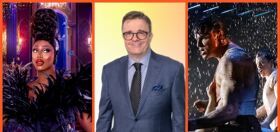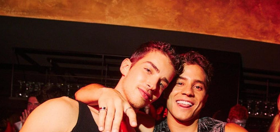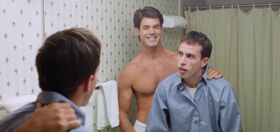 It’s been 30 years since Jimmy Somerville’s soaring, plaintive wail helped turn Bronski Beat’s “Smalltown Boy” into what would become, arguably, the most enduring LGBT anthem ever released. Now decades after recording some of the most memorable dance songs of the 1980s, including covers of the disco classics “Never Can Say Goodbye” and “You Make Me Feel (Mighty Real),” the out Scottish singer is experiencing a renaissance. In the acclaimed new film Pride, a Bronski Beat concert provides the setting for a pivotal scene in the fact-based comedy-drama, and earlier this year, Somerville recorded a stunning acoustic version of the 1984 classic, proving his glorious voice can still rattle the rafters. Most exciting of all, however, is an album of all-new, disco-inspired material due early next year, including the euphoric just-released first single “Travesty.” Somerville phoned Queerty from London to discuss how he’s been reawakened by his new music, his thoughts on closeted pop stars and how he terrified Boy George.
It’s been 30 years since Jimmy Somerville’s soaring, plaintive wail helped turn Bronski Beat’s “Smalltown Boy” into what would become, arguably, the most enduring LGBT anthem ever released. Now decades after recording some of the most memorable dance songs of the 1980s, including covers of the disco classics “Never Can Say Goodbye” and “You Make Me Feel (Mighty Real),” the out Scottish singer is experiencing a renaissance. In the acclaimed new film Pride, a Bronski Beat concert provides the setting for a pivotal scene in the fact-based comedy-drama, and earlier this year, Somerville recorded a stunning acoustic version of the 1984 classic, proving his glorious voice can still rattle the rafters. Most exciting of all, however, is an album of all-new, disco-inspired material due early next year, including the euphoric just-released first single “Travesty.” Somerville phoned Queerty from London to discuss how he’s been reawakened by his new music, his thoughts on closeted pop stars and how he terrified Boy George.
Queerty: “Travesty” sounds like a long-lost disco anthem from the ’70s. What’s the message behind the new song?
Jimmy Somerville: For me, it’s filled with optimism. I feel more than ever we are in such scary times. It’s about finding a better day. We live in such heavy fearful times and when we go into fearful times we go into a very insular world and become less open to others. That’s what I’m trying to convey with this song.
On this album I feel I’ve gone into a period of really strong self-belief and a new period of how I feel and think and what I can do and achieve. It’s given me such a boost of confidence but not in an arrogant way. It’s more of “I can do this.” I guess I feel like I’ve been reawakened, especially musically. I feel like a kid again.
How about we take this to the next level?
Our newsletter is like a refreshing cocktail (or mocktail) of LGBTQ+ entertainment and pop culture, served up with a side of eye-candy.
The upcoming album is titled Homage. So is it safe to presume the other songs on it are informed by your love of disco?
It’s all in the disco genre. It’s very of the time of strings and horns and guitars and backing vocals. It’s the quality of the track. All those little licks. It’s so integral and organic. It’s like fitting into an old comfortable jumper or sweater.
Were you listening to any disco artists in particular while you were writing the new material?
My head is a nonstop disco. I’ve been having a dance-athon in my head since I was a teenager.
 Why does disco music hold such appeal for you?
Why does disco music hold such appeal for you?
It’s always been there since I was a kid and I’ve always loved it. It’s that cliché of being a young gay man without knowing I was gay but still latching onto female vocals and lyrics about love and loss. Love was such a fantasy for me. I needed to escape from the reality of where I was actually living. I was getting into a fantasy world, not just with disco but with all music. Disco had done something very special for me. I think maybe I understood the freedom and the organic process that was involved in it. When I did this new album I developed an understanding of what that process must have been when people were making those records. Everything comes together. When I was doing this album everyone involved came in and just loved it. It became much easier to communicate and be a part of it and just go with it because everyone was enjoying what they were doing. It was a really fascinating process. No matter how much you dismiss disco, in the back of your head there’s going to a little glitter ball saying, “hello, hello!”
When did you first realize you had such a distinctive singing voice?
I didn’t understand it until much later because as a kid I didn’t really sing. I have been told that I used to walk around the house pretending I was a little human synthesizer. [Laughs] I was just making sounds. I guess that’s where it all started. I didn’t know much about my voice until I was involved in a film called Framed Youth. I sang a poem that became a song on the Age of Consent album called “Screaming.” I remember being in the room then and everyone looking at me, like “What the fuck?!”
Yours is definitely one of the really great falsettos in pop music.
I have a counter-tenor, which is why my speaking voice is so low and I can sing quite low.
Can your voice actually shatter glass?
I did actually shatter a glass once in a venue. What it does do, which is really hilarious, is… once I was doing a benefit with Nik Kershaw and his wife was there and she was pregnant. She said that when I was doing my soundcheck and whenever I hit one of those high sustained notes the baby began kicking like crazy. [Laughs.]
What was your life like before you moved to London and started making music?
It was fucking hellish. It was completely bonkers. I was this tiny little kid with long strawberry blond hair that my mother wouldn’t cut. Everyone thought I was a little girl. I was living in Glasgow in a very hard, working-class community and my mom thought it would be fun to have me run around the summer holidays in lederhosen. [Laughs] I looked like a little girl with strawberry-blond hair running around in lederhosen. Does that not just say “pick on me?” I was like nothing else running around those streets, for sure.
You mentioned the album Age of Consent. Besides being one of the best albums of the ’80s, it’s a contender for the greatest queer album ever recorded. Did you realize at the time just how revolutionary it was?
Well, you can’t look into the future, but I was very aware of what I was doing at the beginning. I knew the platform I was using and realized that we could really go to town and be out there. We could be in your face. That was the intention. We were young and involved in that musical, artistic, creative fashion explosion that happened in the early-to-mid ’80s. That’s when gay politics really exploded into the mainstream and we were part of that. We were able to take it to another level because we were in a pop band and had access to media.
It’s now been 30 years since “Smalltown Boy” was released. That video helped a lot of people realize they were gay and to come out. What inspired you to write it?
It was about having that political visibility and being seen. It’s very simple. There’s a naivety in it, but there’s also a very strong emotional cry and I think that’s the power of it. There’s no ambiguity, but it’s very real and emotional. It’s not the most complex of lyrics, but it appeals across the board. It’s what it is. It’s difficult to explain. At the time I wasn’t too involved in “what am I trying to be here?” It was more about what I was trying to evoke. In a sense, it wasn’t just me. There were other friends who were involved in the young gay scene and involved in the video. It was part of a package, really.
It still has a lot of power today.
I think it has the power to evoke emotional response and something inside. We can all run around with our fists in the air and shouting slogans, but when you feel something inside is when it really matters. At the time you were being saturated with all the typical MTV, big budget, over-the-top videos and you wonder, What the hell is this shit about? Then suddenly there was this very gritty video that had a narrative and was telling a story as real as it possibly can and taking you on a pulsing journey. What happened to me in the video, it didn’t matter about the location because people could identify with the character.
Was the record label supportive of the video?
They were. I realize it was a cynical move in some respects because they realized it hadn’t been done before. The realized that we were in an industry, especially in the U.K., where you were allowed to be very in your face and take risks and do something different. They understood that and were definitely behind us. Then they were going to take us to America and make us big and tried to claw it back in a bit, but the genie was already out of the bottle.
There’s a scene in the new film Pride that takes place at a Bronski Beat concert. Has this helped introduce your music to a new generation?
I haven’t seen the film yet. I’m going to wait for it to come out on DVD. I know I’m going to bawl my eyes out so I’m going to do that in private. I’m not sure what will happen but there’s a generation who’ll be awakened to what was actually happening at that time. For me, Pride is about such a fantastic, sweet time. LGSM (Lesbians & Gays Support the Miners) was ignored by much of the media, even the left-leaning media. So it’s great that it’s getting recognition with this movie. For me, it’s a very emotional time because the main character Mark was my best friend. We met each other when we were very young, around 18. We were part of this underground new gay scene that was about politics and music and art and discussion. We were inseparable. We were known as “Double Trouble.” The movie is bringing up a lot of stuff for me. I’m processing stuff that I couldn’t before. It’s a nice place to be in to be able to do that.
As one of the few openly gay pop stars in the ’80s, you were certainly a trailblazer. How did you feel about closeted entertainers at the time?
I had to look at my behavior during that period. It’s what it was at the time. I knew so many people who were being so successful and just putting their careers first and not saying much. During the emergence of what was happening with AIDS, no one was saying anything. Then here was us trying to get as much information as we could and trying to put it out there and talk about it. I felt kind of alone and on my own. I can still be like this but then I was so opinionated and it was my way or no way and if you didn’t do what I wanted you were just going to get your face slapped. I was that kind of activist. [Laughs] I was never really gifted with diplomacy.
I have a funny story about this. Whenever we did Top of the Pops, I often wondered why my dressing room was halfway across the building. It was because I was made to stay away from everyone else because I had such a big mouth. Boy George is such a big guy and when we finally got to talk and be sort of friendly he said to me, “ I was so terrified of you. You had the biggest fucking mouth!”
I think that being so honest and open at the beginning of your career must have inspired your fans to remain loyal over the years.
I do have very loyal fans and who are still interested in what I do. They really support me and wait for new stuff to come out. There are always new people discovering the older songs and that’s really awesome.
Listen to “Travesty” below and vote for it in the Queerty awards.
























durkART
I TRULY enjoy Jimmy Somerville’s music – I Love his music. I love his new tune “Travesty” , and I can’t wait till the whole record becomes released. I’m buying it!!! Continued success and continued health to Jimmy. XOX
buddy-x
I was introduced to Jimmy by some older gay friends in the early nineties. I was just coming out and hearing Jimmy sing about love and longing as a gay man was just what I needed to hear. His music was a revelation to me I will always appreciate his voice and his stance as a proud and out gay singer.
Cam
These are people that I wish would get mentioned more. You have the HRC publicity machine trying to tell us that sellouts like Joe Solemnase or people like him did something for gay rights.
This was a guy who career be damned was out decades ago. Wow.
maxdadmark
“Thank the stars” that Somerville is done experimenting. I have been a fan for 30 years, and his last LP Suddenly Last Summer (2009) was SO bad that no second-hand music store would give me anything for it. I suppose I’m not enough of a diehard fanboy. I am looking forward to this return to form.
Lance Mullholland
My favorite ginger Scot ! His voice is as clear as ever, and there is no doubt that he was out when it was a message for gay rights.
I will definitely buy a copy to add to my J.S. collection –
RSun
As a teenager, I remember seeing the video for Smalltown Boy for the first time and thinking “hey…that’s me.” I owe much to Jimmy and will also be buying this.
jmmartin
I might be frightened, too. As for Boy George, I recently had the pleasure of spending a week in Puerto Escondido. I went down to the old town, the Adoquin, and had a pizza at one of the pedestrian walk’s best restaurants, the Galeria. While I was eating pizza, Boy George’s “Karma Chameleon” came on the audio systerm. My first thought was, that guy has a great voice! My second thought was, the group caught a lot of crap from critics who dissed what appeared to them as drag. When I bought the album, I liked every track. I thought it was a fine album. I am a small town Boy George admirer.
Wooly
I was floored when Bronski beat came on the scean. Wow, boys singing about boys. While “Small Town Boy” was good I really liked “Why”; it was just so out there for the time. Still, Boy George did it for me. My bedroom was covered with Culture Club posters. During their hay day, Culture Club was it. I can still recall Boy George with his make-up long locks of hair and little blakc hats. Ah, it was a great decade. Today things are much different and in a lot of respects pointless. Then again gen Ys or Zs would probably disagree. Finally I would like to say thank you to another queen who I worship, the Great Divine. UK gave us Boy George but the US gave us Divine. I wish he/she was still around. Rest in peace Mis Pink Flamingos. Ah, writing about all this brings back so many memories. First kissess, first gropes in the car and the first time. I’m off to get tissues. sniff sniff
Blackceo
Great to see that Jimmy Somerville has new stuff coming. I was only 6 at the time Smalltown Boy came out, but the significance of it during those times was huge.
I was in the UK last year around the holidays and i hadn’t listened to the song in years. A retail store over there called Boots used Smalltown Boy in one of their holiday ads and it helped me rediscover what a great, classic 80s song it is. So weird too because i go through spurts where i like to listen to certain songs i haven’t in awhile and for the past few weeks its been Smalltown Boy so I’m glad for this article and to see Jimmy has new stuff on the way.
TrueWords
I remember watching this video in the living room on ONTV in Chicago (I grew up in the housing projects there)…I knew exactly what this song was for me (I used to watch it with such intensity while my family members were clueless) and it helped me succeed in school and leave…not that my home life was miserable (fore it was all that I had known) but it dangerous…but it was NOT mine…there were no examples of the kind of love that I needed in my life there…so I wasn’t a “smalltown boy” in the traditional sense but rather a boy that needed to seek out his own life…
Fast forward: now I am 46 years old living in Washington State where I am married to a great guy but this song and the original video still “haunt me with tenderness and hope” as there are so many men of the past and even present who are “Smalltown Boys”…
What a great anthem for self-discovery:
Mother will never understand
Why you had to leave
For the love that you need
Will never be found at home
blackberry finn
Listening here to Jimmy’s new single, I was 17 again, back in that little bedroom in downstate Illinois, dreaming, waiting. All of the Smalltown gays who saw the STB video on MTV felt the same electricity. That electricity connected us.
zoomlens
Christmas 1984. I was home from college at my parent’s house in a little town in Oklahoma. I spent a lot of time watching MTV which we didn’t get at school. I remember seeing the video for “Smalltown Boy” for the first time and feeling an immediate connection. I watched MTV for hours hoping to see the video again. As soon as I got back to school I ran to the campus store and bought the Age of Consent album. I popped the cassette (cassette!!) into my “boom box” and turned up the volume. The music was incredible – so original, so different from what was on the radio in the US. I was loving every second of it until the next to the last song on the album when Jimmy’s falsetto voice signs out “I got those need-a-man blues making me sad.” I panicked when I realized that people walking by room might hear and I shut the cassette player off. I dug through the closet to find a pair of giant headphones, plugged them in and finished the song. I listened to the album through the headphones 5 or 6 times a day for the next couple of weeks until I finally gained the courage to play it out loud again. That album meant so much for me. For the first time in my life I felt a connection to another “smalltown boy” and that gave me hope.
Cam
Wow, these stories people are posting are great!